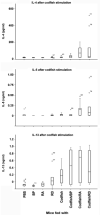Antacids and dietary supplements with an influence on the gastric pH increase the risk for food sensitization
- PMID: 20214670
- PMCID: PMC2999750
- DOI: 10.1111/j.1365-2222.2010.03468.x
Antacids and dietary supplements with an influence on the gastric pH increase the risk for food sensitization
Abstract
Background: Elevation of the gastric pH increases the risk for sensitization against food allergens by hindering protein breakdown. This can be caused by acid-suppressing medication like sucralphate, H2-receptor blockers and proton pump inhibitors, as shown in recent murine experimental and human observational studies.
Objective: The aim of the present study was to assess the sensitization capacity of the dietary supplement base powder and of over-the-counter antacids.
Methods: Changes of the pH as well as of protein digestion due to base powder or antacids were measured in vitro. To examine the in vivo influence, BALB/c mice were fed codfish extract with one of the acid-suppressing substances. Read-out of antibody levels in the sera, of cytokine levels of stimulated splenocytes and of intradermal skin tests was performed.
Results: The pH of hydrochloric acid was substantially increased in vitro by base powder as well as antacids in a time- and dose-dependent manner. This elevation hindered the digestion of codfish proteins in vitro. A significant increase in codfish-specific IgE antibodies was found in the groups fed codfish combined with Rennie Antacidum or with base powder; the latter also showed significantly elevated IgG1 and IgG2a levels. The induction of an anaphylactic immune response was proven by positive results in intradermal skin tests.
Conclusions: Antacids and dietary supplements influencing the gastric pH increase the risk for sensitization against allergenic food proteins. As these substances are commonly used in the general population without consulting a physician, our data may have a major practical and clinical impact.
Figures





References
-
- Schöll I, Untersmayr E, Bakos N, et al. Antiulcer drugs promote oral sensitization and hypersensitivity to hazelnut allergens in BALB/c mice and humans. Am J Clin Nutr. 2005;81:154–60. - PubMed
-
- Untersmayr E, Schöll I, Swoboda I, et al. Antacid medication inhibits digestion of dietary proteins and causes food allergy: a fish allergy model in BALB/c mice. J Allergy Clin Immunol. 2003;112:616–23. - PubMed
-
- Black JW, Duncan WA, Durant CJ, Ganellin CR, Parsons EM. Definition and antagonism of histamine H 2 -receptors. Nature. 1972;236:385–90. - PubMed
Publication types
MeSH terms
Substances
Grants and funding
LinkOut - more resources
Full Text Sources
Medical
Research Materials

